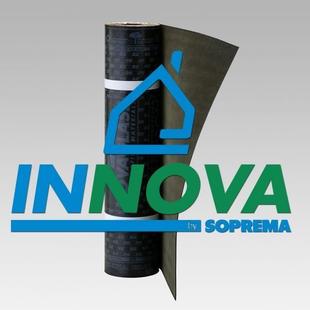NOVA HP
BPP Plastomeric polymer-modified bitumen membrane (-20°C) with non-woven continuous filament reinforcement with high dimensional stability, stabilised with glass fibre. Certified for waterproofing bridge decks. INNOVA Line.
Description
NOVA HP is a waterproofing membrane with plastomeric polymer bitumen waterproofing mass (BPE according to Standard UNI 8818),comprised of:
• distilled bitumen modified with a zirconocene-derived elastoplastomeric polyolefin alloy with high homogeneity and thermodynamic stability, which, due to the intrinsic thermal inertia expressed by the morphology of the polymers used, gives the product high elasticity, excellent cold flexibility, thermal stability and resistance to natural oxidative degradation; indispensable properties to guarantee high
performance including: high adhesion to the laying surface, resistance to UV rays and impact, long-term performance.
• composite non-woven very heavy-weight CONTINUOUS FILAMENT polyester reinforcement, stabilised with glass fibre for high dimensional stability, resistant to puncture and tears.
The membrane is the non-self-protected type with non-adhesive amorphous sand coating on the outer surface, and inner surface with hot-melt polyolefin adhesive film. It is certified for the waterproofing of concrete bridge decks and other trafficked areas of concrete in compliance with Standard EN 14695.
FIELDS OF APPLICATION
The membrane’s high mechanical strength and cold flexibility, combined with high resistance to weathering, allow its application in single-layer systems (minimum recommended thickness 5 mm), or as a finishing layer in multi-layer systems (bonded to membranes compliant with EN 14695), for the waterproofing of concrete bridge decks and other trafficked areas of concrete. The membrane allows hot asphalt paving directly on its surface.
The membrane is suitable for waterproofing systems on ballasted roofs in general, including parking slabs, foundations, pavements, walls, tanks (to prevent water from rising up from the ground or between sections of the structure) and in all situations where a water barrier is required. Its characteristics make it suitable for all climates.
It is not suitable for use on green roofs.
Implementation
The membrane’s thermoplastic properties allow it to be regularly applied by torch or with a hot air generator. The subsequent hot asphalt paving (at a temperature of at least 140/150 °C) further activates the adhesion of the mass, simultaneously promoting the adhesion of the asphalt to the membrane, and of the membrane to the substrate.
Need more information ?

